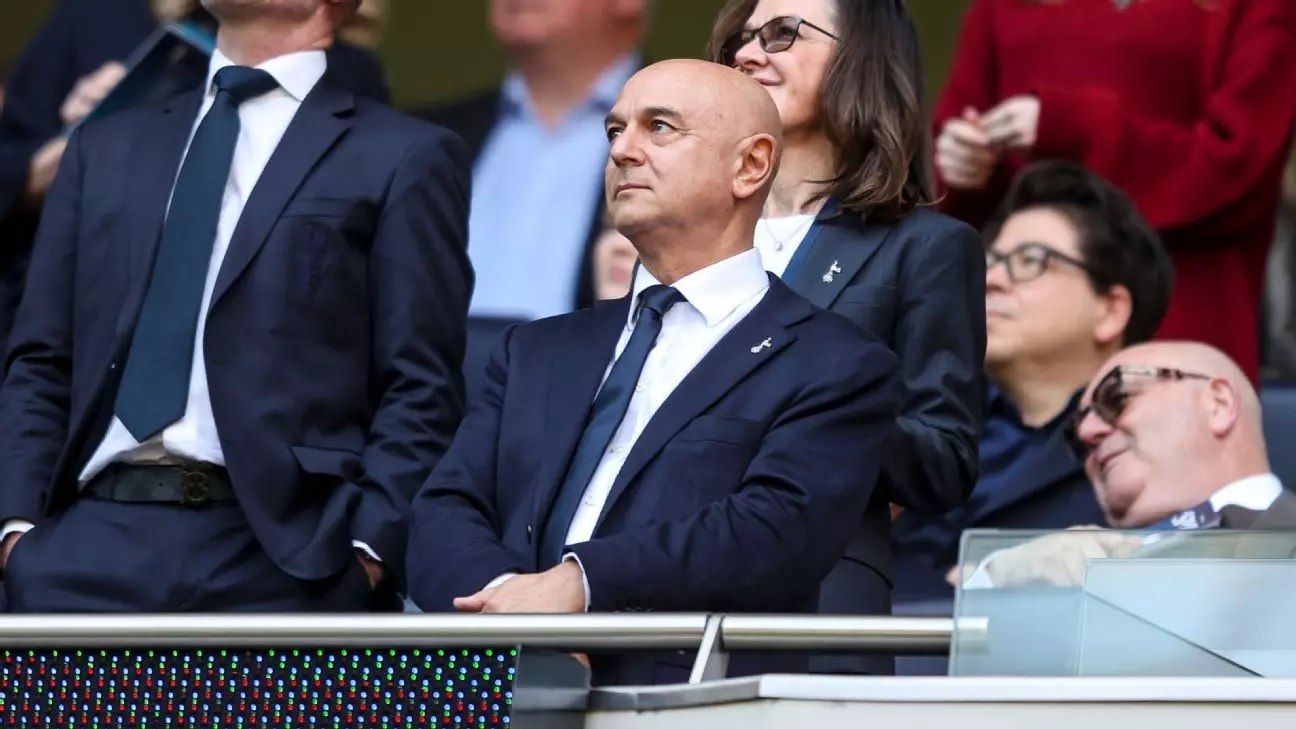Tottenham Hotspur finds itself at a crossroads. The club’s chairman, Daniel Levy, is in the hot seat, grappling with growing discontent among fans over transfer spending. Despite leading Spurs to financial growth, Levy’s recent statements have stirred mixed reactions, particularly this season as the team flounders at a disappointing 14th place in the Premier League. Can Levy strike a chord with the supporters who feel that the team’s financial resources do not correlate with on-pitch performance? As Tottenham struggles through this tumultuous season, it begs the question: what constitutes prudent spending, and at what point does economic caution hinder the spirit of competition?
While Levy insists on a commitment to financial sustainability, fans yearn for a visible commitment to success. The reality is stark; Tottenham remains a powerhouse in terms of revenue, being ranked the ninth richest club globally. Yet, the distress of supporters stems from what they perceive as a lack of ambition to translate that wealth into visible success. Levy’s assertion from earlier this season, emphasizing long-term financial stability and sustainable spending, can come across as mere platitudes when the team’s performance lapses, underlining a disconnect between strategic foresight and the immediate desires of devoted fans.
The Trophy Drought: Pressure on the Pitch
This season marks a frustrating chapter in Spurs’ ongoing quest for silverware. With an ever-expanding trophy cabinet overdue for reinforcements, the lack of immediate success ratchets up the urgency. Levy notes that winning the Europa League could salvage the season and secure coveted Champions League qualification, but the path is laden with obstacles, including daunting encounters such as their upcoming clash against Eintracht Frankfurt. The narrative surrounding Spurs is shrouded in a history of near misses, and as the club seeks a much-needed victory to break their 17-year trophy drought, expectations grow.
Moreover, the season has been marred by injuries and poor form. Critical matches have slipped away, leaving fans disheartened as the team squanders vital points. Each lost match heightens calls for accountability from management. Questions loom over whether the club’s strategy under Postecoglou has bolstered competitiveness, or merely masked deficient squad depth and quality. Considering that preparations are meant to position the club for success, it raises the question: can efforts focused primarily on financial prudence truly yield the results necessary in such a highly competitive environment?
Transforming the Squad: Assessing Recruitment and Development
An overhaul of the first-team squad was initiated during the previous season, with promising signings like Micky van de Ven, James Maddison, and Brennan Johnson brought onboard to revitalize the roster. Yet, the departure of Harry Kane to Bayern Munich looms large, creating a vacuum that has proven difficult to fill. The questions swirling around Spurs’ recruitment strategy fuel anxiety amongst fans—are the new arrivals capable of mirroring the contributions of an iconic player like Kane?
Levy has emphasized the need for smart purchases that fit within financial means, and while this sounds admirable, the pressing need for immediate impact players cannot be ignored. The current campaign’s challenges underscore a central truth in football: a team can only thrive if its talent is nurtured and maximized effectively. As opponents grow stronger with each passing transfer window, Spurs risks becoming complacent.
However, it’s important to acknowledge that player development plays a critical role in unlocking a team’s full potential. From grassroots to first-team selections, Tottenham must cultivate talent to mitigate reliance on high-profile signings. The balance between nurturing homegrown players and judiciously investing in established stars must pivot from merely philosophical to actionable.
Women’s Team Struggles: A Parallel Narrative
Parallel to the men’s side, the Tottenham Hotspur women’s team has faced its own set of challenges. Under head coach Robert Vilahamn, the squad has struggled to generate consistent results, currently languishing in ninth place in the Women’s Super League. While the men’s squad holds onto a sliver of hope in the Europa League, the women’s team experiences growing speculation around their managerial stability. Both sides of the club are under immense scrutiny, illustrating how the pressure for success runs deep within the Tottenham fabric.
It’s crucial that the club takes a holistic approach; the same support and ambition that invigorate the men’s squad must also reflect in the women’s program. As rollercoaster seasons unfold, Spurs must align resources to foster success across the board, ensuring that neither side falls by the wayside.
In a time marked by trials and tribulations, Tottenham Hotspur stands at a pivotal moment in its history. With passion coursing through its fanbase and financial stability in its coffers, the call for a future rich in trophies and glory reverberates louder than ever. How the club responds to this season’s challenges, balancing ambition with economic realism, will chart its course for years to come. The resilience displayed by players, management, and supporters alike will define the essence of Spurs in this fiercely competitive landscape.


Leave a Reply